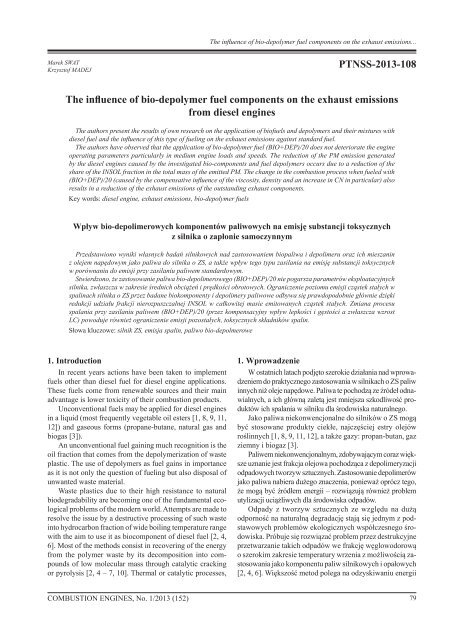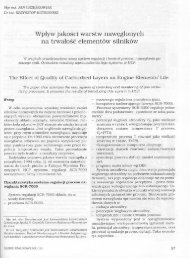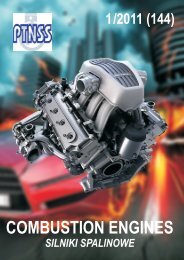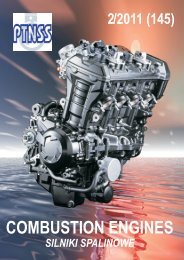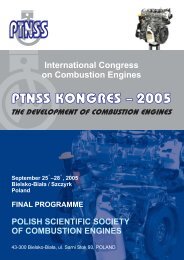You also want an ePaper? Increase the reach of your titles
YUMPU automatically turns print PDFs into web optimized ePapers that Google loves.
The influence of bio-depolymer fuel components on the exhaust emissions...<br />
Marek SWAT<br />
Krzysztof MADEJ<br />
PTNSS-2013-108<br />
The influence of bio-depolymer fuel components on the exhaust emissions<br />
from diesel engines<br />
The authors present the results of own research on the application of biofuels and depolymers and their mixtures with<br />
diesel fuel and the influence of this type of fueling on the exhaust emissions against standard fuel.<br />
The authors have observed that the application of bio-depolymer fuel (BIO+DEP)/20 does not deteriorate the engine<br />
operating parameters particularly in medium engine loads and speeds. The reduction of the PM emission generated<br />
by the diesel engines caused by the investigated bio-components and fuel depolymers occurs due to a reduction of the<br />
share of the INSOL fraction in the total mass of the emitted PM. The change in the combustion process when fueled with<br />
(BIO+DEP)/20 (caused by the compensative influence of the viscosity, density and an increase in CN in particular) also<br />
results in a reduction of the exhaust emissions of the outstanding exhaust components.<br />
Key words: diesel engine, exhaust emissions, bio-depolymer fuels<br />
Wpływ bio-depolimerowych komponentów paliwowych na emisję substancji toksycznych<br />
z silnika o zapłonie samoczynnym<br />
Przedstawiono wyniki własnych badań silnikowych nad zastosowaniem biopaliwa i depolimeru oraz ich mieszanin<br />
z olejem napędowym jako paliwa do silnika o ZS, a także wpływ tego typu zasilania na emisję substancji toksycznych<br />
w porównaniu do emisji przy zasilaniu paliwem standardowym.<br />
Stwierdzono, że zastosowanie paliwa bio-depolimerowego (BIO+DEP)/20 nie pogarsza parametrów eksploatacyjnych<br />
silnika, zwłaszcza w zakresie średnich obciążeń i prędkości obrotowych. Ograniczenie poziomu emisji cząstek stałych w<br />
spalinach silnika o ZS przez badane biokomponenty i depolimery paliwowe odbywa się prawdopodobnie głównie dzięki<br />
redukcji udziału frakcji nierozpuszczalnej INSOL w całkowitej masie emitowanych cząstek stałych. Zmiana procesu<br />
spalania przy zasilaniu paliwem (BIO+DEP)/20 (przez kompensacyjny wpływ lepkości i gęstości a zwłaszcza wzrost<br />
LC) powoduje również ograniczenie emisji pozostałych, toksycznych składników spalin.<br />
Słowa kluczowe: silnik ZS, emisja spalin, paliwo bio-depolmerowe<br />
1. Introduction<br />
In recent years actions have been taken to implement<br />
fuels other than diesel fuel for diesel engine applications.<br />
These fuels come from renewable sources and their main<br />
advantage is lower toxicity of their combustion products.<br />
Unconventional fuels may be applied for diesel engines<br />
in a liquid (most frequently vegetable oil esters [1, 8, 9, 11,<br />
12]) and gaseous forms (propane-butane, natural gas and<br />
biogas [3]).<br />
An unconventional fuel gaining much recognition is the<br />
oil fraction that comes from the depolymerization of waste<br />
plastic. The use of depolymers as fuel gains in importance<br />
as it is not only the question of fueling but also disposal of<br />
unwanted waste material.<br />
Waste plastics due to their high resistance to natural<br />
biodegradability are becoming one of the fundamental ecological<br />
problems of the modern world. Attempts are made to<br />
resolve the issue by a destructive processing of such waste<br />
into hydrocarbon fraction of wide boiling temperature range<br />
with the aim to use it as biocomponent of diesel fuel [2, 4,<br />
6]. Most of the methods consist in recovering of the energy<br />
from the polymer waste by its decomposition into compounds<br />
of low molecular mass through catalytic cracking<br />
or pyrolysis [2, 4 – 7, 10]. Thermal or catalytic processes,<br />
1. Wprowadzenie<br />
W ostatnich latach podjęto szerokie działania nad wprowadzeniem<br />
do praktycznego zastosowania w silnikach o ZS paliw<br />
innych niż oleje napędowe. Paliwa te pochodzą ze źródeł odnawialnych,<br />
a ich główną zaletą jest mniejsza szkodliwość produktów<br />
ich spalania w silniku dla środowiska naturalnego.<br />
Jako paliwa niekonwencjonalne do silników o ZS mogą<br />
być stosowane produkty ciekłe, najczęściej estry olejów<br />
roślinnych [1, 8, 9, 11, 12], a także gazy: propan-butan, gaz<br />
ziemny i biogaz [3].<br />
Paliwem niekonwencjonalnym, zdobywającym coraz większe<br />
uznanie jest frakcja olejowa pochodząca z depolimeryzacji<br />
odpadowych tworzyw sztucznych. Zastosowanie depolimerów<br />
jako paliwa nabiera dużego znaczenia, ponieważ oprócz tego,<br />
że mogą być źródłem energii – rozwiązują również problem<br />
utylizacji uciążliwych dla środowiska odpadów.<br />
Odpady z tworzyw sztucznych ze względu na dużą<br />
odporność na naturalną degradację stają się jednym z podstawowych<br />
problemów ekologicznych współczesnego środowiska.<br />
Próbuje się rozwiązać problem przez destrukcyjne<br />
przetwarzanie takich odpadów we frakcję węglowodorową<br />
o szerokim zakresie temperatury wrzenia z możliwością zastosowania<br />
jako komponentu paliw silnikowych i opałowych<br />
[2, 4, 6]. Większość metod polega na odzyskiwaniu energii<br />
<strong>COMBUSTION</strong> <strong>ENGINES</strong>, No. 1/2013 (152)<br />
79


